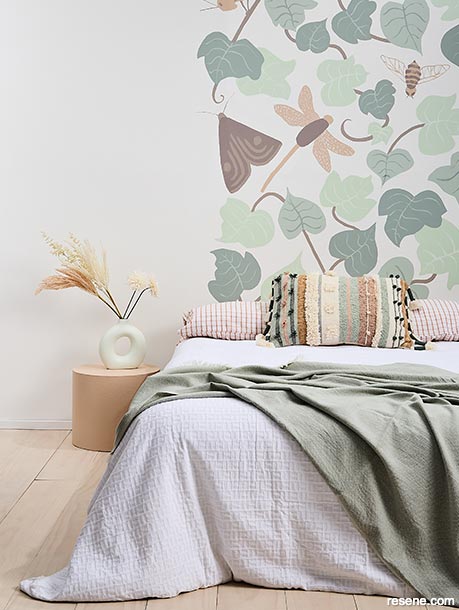From habitat magazine - issue 38, plant-based paints
It’s even easier being green with Resene’s growing range of plant-based paints.

Sleep easy by decorating your bedroom with Resene Room Velvet from Resene’s range of plant-based hybrid waterborne alkyd paints.
Wall painted in Resene Eighth Rice Cake with leaves and insects in Resene Edward, Resene Rainee, Resene Kandinsky, Resene Cashmere, Resene Zorba, Resene Tom Tom and Resene Willow Brook. Side table in Resene Cashmere and vase in Resene Double Rice Cake. Resene Living duvet from Briscoes, pillowcases, throw and cushion from Adairs.
The world of eco, plant-based paints is fastgrowing, but it can be tricky to navigate the jargon. Low-VOC, no added VOC, hybrid waterborrne alkyds, plant-based, bio-based, renewable, organic and natural paints are just a few of the technical terms thrown around to describe eco paints. Plant-based paints are an exciting growth area, but it’s easy to get confused about the new eco technologies available and hard to know what to believe. Resene thinks choosing environmentally preferable paints, primers, sealers and wood stains should be simple. That’s why Resene has Environmental Choice approval for the waterborne paints homeowners most commonly use so you can be confident they have been checked by New Zealand’s official ecolabel who independently verifies each Resene product that has approval.
Resene has been committed to producing environmentally preferable paint products since just after we started, launching the first waterborne paints in the 1950s, removing lead from paint proactively, joining the Environmental Choice programme in 1996 and continuing to offer the widest range of Environmental Choice NZ approved paints today. Renewable plant-based paints are the next breakthrough in eco paints.
Resene has had many paints free of animal products, such as beeswax or tallow, for years, including crowd favourites Resene Lumbersider, Resene SpaceCote Flat, Resene Enamacryl and Resene Lustacryl to name a few. But the new plantbased range, using hybrid waterborne alkyds, is the latest advancement.
The focus on hybrid waterborne alkyd formulas aims to reduce fossil hydrocarbons (a chemical name for oil) in paint. For a number of years, Resene technicians have been researching and developing renewable paints that reduce the need for carbon sourced from fossil hydrocarbons, which can contribute to atmospheric carbon dioxide and the greenhouse effect. Instead, hybrid waterborne alkyds obtain carbon from organic sources, which can be recycled into the atmosphere and plant growth without increasing atmospheric carbon dioxide.
Hybrid waterborne alkyds are paints made with plant oils (alkyd polymers), such as linseed and castor oil, combined with other polymers, to give 60-95% per cent renewable content. Resene’s new range of plant-based hybrid waterborne alkyds includes Environmental Choice approved Resene Room Velvet low sheen for interior walls, Resene Waterborne Lusta-Glo semi-gloss for trims and Resene Woodsman Decking Oil Stain for decking, with two more ranges to be launched this year.
The purpose of paint is to protect surfaces, and in doing so extend the longevity of homes and other projects. Doing this well is the best environmental impact products can have. Always choose a product that is designed for your project to get the best performance out of the product and least maintenance. It’s better to paint once with a quality product, than repaint many times with a low quality one.
top tip Resene Room Velvet low sheen hybrid waterborne alkyd dries to a beautiful, even, silky low sheen finish. Based on a tough plant-based, flexible hybrid waterborne alkyd resin, this low odour formulation is easy to apply and highly durable.
› To find out more about this fascinating topic, visit www.resene.com/plantbased.
Project: Shani Luckman
Images: Bryce Carleton
Search habitat magazine stories
Printed copies of habitat highlights are available from late March 2024 at Resene ColorShops and resellers, while stocks last. You can view back issues of habitat magazine online.
Specifiers:
If you have an idea, project or story that you think would suit habitat, we’d love to hear from you. Please drop us an email with your details and include photos if submitting a project.
Sign up for a DIY card and Save! Australia | New Zealand